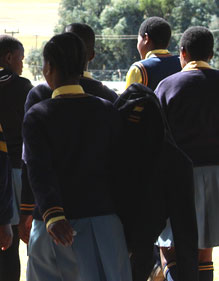|
Getting your Trinity Audio player ready...
|
 By Valencia Talane
By Valencia Talane
A high school learner walks into a classroom just before the start of her next lesson and heads straight towards a teacher who is sitting at her desk in front. The learner hands the teacher some money and in turn receives a document.
A door to an adjacent room opens and out of it walk a female teacher and male learner. As the learner hurriedly tucks his shirt into his pants and the teacher lowers her mini skirt it becomes clear what has just transpired. A sexual act between a minor and his teacher, the latter obviously abusing her authority.
The two incidents happen in full view of the rest of the class as other learners trickle in and settle down for the lesson. It is soon business as usual and the culprits have made no effort to hide the wrongful acts that just happened.
The scene described above is acted out in a video produced by a group of learners from schools in the Free State who are taking part in the Model Youth South Africa (MYSA) challenge organised by Corruption Watch. The competition encourages learners to participate in anti-corruption activities in schools, with the particular goal of seeking accountability from authorities.
The learner in the first scene just bought herself a chance at getting better marks in an upcoming test without having to study for it. As for the male learner – a victim of sexual abuse by an adult entrusted with his care – it is not clear in the video what the benefit is. But both acts by the teachers warrant punishment as they are abusing their power as figures of authority.
As long as there are learners who willingly pay their way into passing exams without hard work, there will be teachers who sell question papers, and vice versa.
Encouraging learners to fight corruption in their schools
The MYSA contest was launched in March with Corruption Watch and Debate Afrika as co-organisers. Learners were selected from 10 schools across Bloemfontein and each team of five members each had to produce a short video, under the theme My corruption-free school, depicting acts of corruption as they interpret it. The videos were also meant to demonstrate the different teams’ corruption-busting methods and their message to encourage fellow learners to pitch in.
Abuse of authority in schools is not the only manner in which corruption happens, but it is the most common. The abuse also takes several forms, and culprits vary in their positions of seniority. Teachers and principals are often implicated in reports sent to Corruption Watch as the alleged perpetrators of abuse of power in schools.
Giving children the help they need to fight sexual abuse in school
A new handbook that provides guidance on sexual abuse in schools was recently released by the Centre for Applied Legal Studies (CALS), a programme of Wits University. Managing Sexual Abuse in Schools: A Guide for Children, Families and Community Members aims to educate young people – and learners in particular – about the signs of potential sexual abuse in schools, and how to handle it. The publication also tackles the steps that learners can take to bring culprits of the crime to book.
Every effort is made by CALS to detail examples of the various manifestations of abuse by authorities in a school environment. The scope of issues covered include the physical and psychological impact of sexual abuse using simple language that is learner-friendly. Beyond that, however, the guide gives practical step-by-step advice on how to ensure the punishment of the culprits.
For Corruption Watch, it is the efforts in its stakeholder engagement work with the different education departments across the country that will hopefully bring about solutions to the problem of abuse of power in schools.
For now, however, it is the MYSA challenge participants who will assist their peers in speaking out against abuse and eradicating it from their places of learning.






